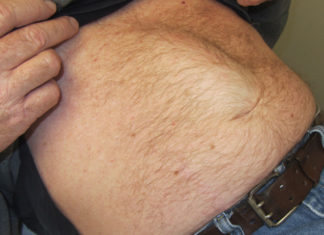Sudden unexplained weight loss can be a serious matter of concern. It is best to consult a doctor or go for a checkup if you recently lost a considerable amount of weight, like more than 5 to 7% of your weight, within a short span of a few months.
Weight loss is normal, and it may happen for a change in lifestyle or any stressful period that you have gone through recently.
But, if you notice sudden warning signs of symptoms, it is necessary to take medical assistance. Let us look at the causes of unexplained weight loss in men:
1. Loss of Muscle
Loss of wasting of muscle can cause unexpected weight loss. Extreme weakness is the initial sign of loss of muscle. One of the limbs can even look smaller compared to the other.
Our bodies are made up of fat and some normal mass free of fat like water, muscle, and bone. With the loss of muscle, you will lose a significant amount of weight from your body. If you do not use your muscle frequently for a long period, it can lead to muscle loss.
It is usually among people who do not exercise, work, or work at the desk in an idle sitting posture or are bedridden. Proper exercise and the correct proportion of nutrition will stop the loss of muscle. Other possible reasons for muscle loss include:
- Injuries like broken bones
- Burns
- Increase in Age
- Stroke
- Osteoarthritis
- Rheumatoid Arthritis
- Osteoporosis
- Damage of Nerves
- Multiple Sclerosis
2. Highly Active Thyroid
Hyperthyroidism or hyperactive thyroid occurs when the thyroid gland produces plenty of thyroid hormones. These hormones help to control many body functions like metabolism and many others. If the thyroid becomes overactive, you will start losing calories.
So, even if you have a great appetite, you will still lose calories, resulting in sudden and mysterious weight loss. Other signs include:
- Irregular, fast heartbeat rate.
- Too much anxiety
- Tiredness and Fatigue
- Intolerance of Heat
- Trouble with Sleep
- Tremors and shake of hands
3. Rheumatoid arthritis
Rheumatoid arthritis refers to an auto-immune disease that makes the immune system affect the lining of the joints. This eventually leads to inflammation. It can make metabolism run fast and result in overall weight loss.
Symptoms of Rheumatoid arthritis include pain, stiff joints, and joint swelling. Usually, Rheumatoid arthritis occurs due to:
- Aging Problem
- Genetic Problem
- Changes in Hormones
- Too much Smoking
- Counter- smoking
- Extreme weight or Obesity
Treatment of Rheumatoid arthritis usually starts with medication.
4. Diabetes
Type 1 Diabetes is a significant cause of untold weight loss. If you are suffering from Diabetes 1, your immune system will attack the cells of your pancreas, which form insulin. Without the proper content of insulin, our bodies cannot use glucose for energy. This also results in high blood glucose.
The kidneys aid to remove the excess glucose through urine. This reduces the sugar content, which results in calorie loss. Other symptoms of Type 1 Diabetes are:
- Often Urinating
- Dehydration, dry mouth, and throat
- Tiredness and Fatigue
- Blurry and unclear vision
- Too much thirst
- A high intensity of hunger
Insulin, monitoring blood sugar levels, changes in diet and daily exercise can reduce the adverse effects of Type 1 Diabetes.
5. Depression
Depression can also be a significant cause of weight loss. Depression attacks the same parts of the brain that controls our appetite. So, depression can lead to loss of appetite and, gradually, weight loss. Again for many, depression can also increase their appetite.
The symptoms differ from person to person. Common symptoms of depression are:
- Perpetual sadness
- Lacking interest and enthusiasm towards life
- Loss of energy
- Bad level of concentration
- Too much or too little sleeping
- Frequent thoughts of suicide and death
- Irritated mood always
Steps like counselling, behavioural therapy, therapy for psychology, and antidepressants will treat depression over time.
6. Disease of Inflammatory Bowel
Sudden weight loss may be due to inflammatory bowel disease. It results in chronic disorders of the inflammatory digestive tract. The two most common diseases of Inflammatory Bowel are Ulcerative Colitis and Crohn’s disease.
This results in a catabolic condition where the body is continuously using up the energy. Inflammatory bowel disease also harms ghrelin, the hormones responsible for hunger and leptin. This all leads to a sudden loss of appetite and weight.
Other symptoms are:
- Diarrhea
- Stomach Bloating
- Stomach pain
- Stools with blood
- Tiredness and fatigue
In severe cases, it might require the need for surgery for treatment.
7. Chronic Obstructive Pulmonary Disease
This denotes a lung disease. It includes Chronic Bronchitis and Emphysema. Emphysema gradually ruins the air sacs of the lungs, making it difficult to breathing. Chronic bronchitis causes inflammation of the airways. This results in:
- Formation of mucus
- Chest-tightening
- Too much coughing
- Breathing issues.
- In later stages, Chronic Obstructive Pulmonary Disease can cause loss of weight too.
Difficult breathing requires labour which eventually burns a lot of calories. Those people affected by this will face uncomforting eating and breathing at the same time. Other symptoms are:
- Loss of muscle endurance capacity
- Swelling of ankles, feet, and legs
- Tiredness and fatigue
The main cause of Chronic Obstructive Pulmonary Disease is smoking cigarettes. Air pollutants and dust particles can also cause this.
8. Endocarditis
Endocarditis results in inflammation of the inner lining of the heart or endocardium. It grows when bacteria enter the blood flow and collects in the heart.
Most people with this problem suffer from fever. This is more common among men than women. Endocarditis elevates body temperature and increases metabolism and fat burn, leading to weight loss.
Other symptoms include:
- Murmuring of heart
- Coughing
- Pain in the abdomen
- Pain in chest
- Difficulty in breathing
- Sweating at night
- Pain in the back
- A headache
- Purple of red patches or spots on the skin
Endocarditis affects those with damaged heart valves, artificial valves of the heart, or genetic heart problems. Antibiotics will help to reduce the effects of Endocarditis. However, in some extreme cases, it may require surgery.
9. Tuberculosis
Tuberculosis is a contagious disease that generally affects the lungs. Mycobacterium Tuberculosis Bacteria generally causes this disease. Reduced appetite and weight loss are the most important symptoms.
TB spreads through the air. You can catch TB without getting sick. Symptoms of active Tuberculosis are:
- A bad noisy cough that can last for more than a month also
- Chest pain and congestion
- Coughing up blood
- Tiredness and Fatigue
- Night sweats
- Chills
- Fever
10. Cancer
Cancer is referred to the sudden abnormal growth of cells that spreads gradually across the surrounding areas of your body. If someone has cancer in areas like the stomach, lungs, pancreas, and oesophagus, will experience an abrupt fall in weight.
Cancer also expands inflammation that promotes muscle loss and disturbs the appetite hormones. A growing tumour can increase the amount of energy your body can burn while it is at rest.
Some of the major symptoms of cancer include:
- Changes in skin
- Fever
- Tiredness and fatigue
- Pain in the body
- Skin changes
Sometimes, cancer does not even lead to symptoms. Typical cancer treatments include surgery, chemotherapy, radiotherapy, and immunotherapy.
These ten are the most common causes of weight loss. Health issues like Endocarditis, Lung and Pancreas Cancer are more common causes of unexplained weight loss in men than women. Other less common causes are Addison’s disease, HIV and Congestive Heart Failure that leads to weight loss.
If you start losing weight as significant as 6 to 7 kg without diet control and an exercise span of only 7 to 8 months, you should immediately rush to the doctor to avoid further problems. The yearly check-up will recover you faster and save more time and money that would have otherwise drained for future obligations and treatment.






